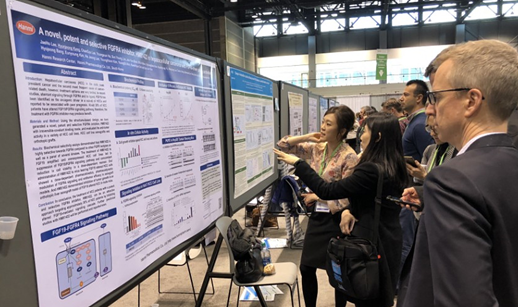
Hanmi Pharmaceutical said Wednesday that it has presented three new drug candidates for target immunotherapy at the American Association for Cancer Research (AACR) Annual Meeting 2018 in Chicago, U.S., from April 14-18.
The three new candidates are an acute myeloid leukemia treatment (HM43239), liver cancer treatment (HM81422), and small-cell lung cancer treatment (HM97211). During the conference, the company also presented the animal test results of all three candidates.
The HM43239 is a candidate to overcome drug resistance of FLT3 inhibitors while inhibiting AML-induced FLT3 (FMS-like tyrosine kinase 3) mutations. Hanmi confirmed the superior efficacy of HM43239 in various animal experiments using FLT3-mutated AML cell lines and plans to enter phase 1 clinical phase in the first half of this year.
HM81422 is a next-generation treatment for hepatocellular carcinoma that selectively inhibits FGFR4 (Fibroblast growth factor receptor 4). Hepatocellular carcinoma is the most common primary hepatocellular carcinoma, accounting for 75 to 90 percent of all hepatocellular carcinomas.
During the preclinical studies, HM81422 showed excellent cell proliferation inhibitory activity against FGFR4 as well as selective inhibition activity against hepatocellular carcinoma cell line. HM81422 also showed an antitumor effect in a monotherapy xenograft model test including the orthotopic model.
FGFR is a fibroblast growth factor receptor involved in cancer growth and proliferation and has four subtypes --FGFR1, FGFR2, FGFR3, FGFR4. Among them, the signal transduction system between FGFR4 and its ligand, FGF19, is believed to be the leading cause of liver cancer.
HM97211 is an anticancer drug that can treat small cell lung cancer (SCLC), which currently has no target immunotherapy. The company has identified a biomarker associated with the anticancer effect of small cell lung cancer and its pharmacokinetic response in a preclinical study.
The drug has a mechanism of selectively inhibiting histone demethylase 1 (LSD1), which inhibits cancer inhibitory genetic factors and induces cancer.
“The company is focusing its research and development (R&D) capability in creating a global new drug in the field of anticancer drug that meets medical needs in fields that lack treatment,” Hanmi Pharmaceutical President and CEO Kwon Se-chang said. “We will do our best to commercialize the drug candidates so that we can give hope to suffering cancer patients.”

